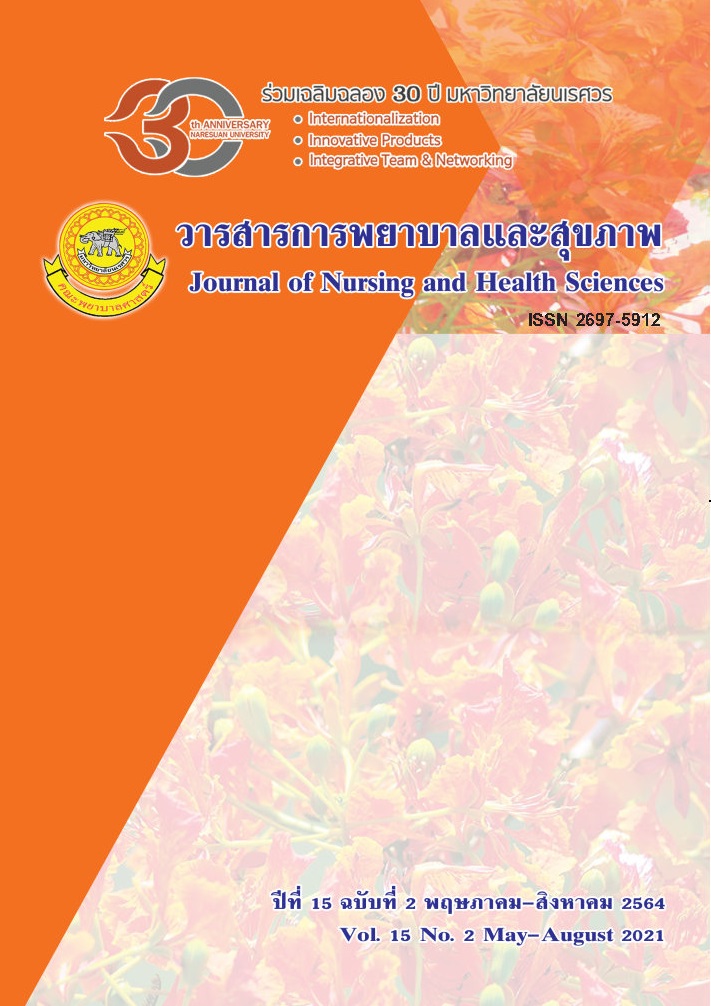ต้นทุนต่อหน่วยและการรับรู้การพัฒนาสมรรถนะการทำงานของพยาบาลในโรงพยาบาลเอกชนแห่งหนึ่ง
Main Article Content
บทคัดย่อ
การศึกษานี้เป็นการวิจัยเชิงพรรณนา มีวัตถุประสงค์เพื่อศึกษาต้นทุนต่อหน่วยในการพัฒนาพยาบาล และศึกษาการรับรู้การพัฒนาสมรรถนะการทำงานของพยาบาลในโรงพยาบาลเอกชนแห่งหนึ่ง ประชากรคือพยาบาลวิชาชีพศึกษาในประชากรจำนวน 341 คน เก็บรวบรวมข้อมูลจากแหล่งข้อมูล 2 แหล่งประกอบด้วย 1. แหล่งข้อมูลปฐมภูมิ ใช้แบบสอบถาม ประกอบด้วย ข้อมูลทั่วไป การรับรู้การพัฒนาสมรรถนะในการทำงานหลังได้รับการพัฒนา และต้นทุนพัฒนาตนเอง 2. แหล่งข้อมูลทุติยภูมิ ใช้แบบบันทึกต้นทุนการอบรมภายนอกหน่วยงานและอบรมภายใน เป็นการเก็บข้อมูลย้อนหลัง 3 ปีงบประมาณ (พ.ศ.2560 – 2562) ได้รับการตรวจสอบความตรงตามเนื้อหาจากผู้ทรงคุณวุฒิ จำนวน 5 ท่าน ได้ค่า CVI เท่ากับ 0.96 และทำการตรวจสอบความเชื่อมั่นแบบสอบถาม มีค่าสัมประสิทธิ์ครอนบาคแอลฟา เท่ากับ .98 วิเคราะห์ข้อมูลด้วยสถิติเชิงพรรณนา โดยใช้ค่าพารามิเตอร์ของเฉลี่ย (μ ) และส่วนเบี่ยงเบนมาตรฐาน ( ) ของประชากร ผลการวิจัย พบว่า ต้นทุนต่อหน่วยในการพัฒนาพยาบาล จำนวน 22,628 บาทต่อคน/ต่อปี โดยมีค่าใช้จ่ายสูงสุดได้แก่ ต้นทุนค่าเสียโอกาสเป็นเงิน 2,381,641 บาท พยาบาลใช้ต้นทุนต่อหน่วยในการพัฒนาตนเองจำนวน 3,678 บาทต่อคน/ต่อปี โดยมีค่าใช้จ่ายสูงสุดได้แก่ ต้นทุนค่าเสียโอกาส 195,000 บาท ในส่วนผลการวิจัยการรับรู้การพัฒนาสมรรถนะในการทำงานของพยาบาลวิชาชีหลังการพัฒนา พบว่า พยาบาลมีการรับรู้ในการพัฒนาสมรรถนะโดยรวมทั้ง 5 ด้านอยู่ในระดับมากโดยด้านที่มีค่าเฉลี่ยอันดับแรกได้แก่ ด้านจริยธรรม คะแนนเฉลี่ย 4.38 (μ = 4.38, σ = .56) และด้านที่มีค่าเฉลี่ยอันดับน้อยที่สุดได้แก่ด้านการสั่งสมความเชี่ยวชาญในงาน มีคะแนนเฉลี่ยเท่ากับ 3.67 (μ = 3.67, σ = .61) ผลการวิจัยนี้ชี้ให้เห็นว่า ผู้บริหารทางการพยาบาลควรมีส่วนร่วมกับงานบริหารทรัพยากรบุคคลเพื่อบริหารต้นทุนให้เกิดประสิทธิภาพสูงสุดโดยเฉพาะต้นทุนค่าเสียโอกาสซึ่งเป็นข้อมูลเชิงประจักษ์ที่เป็นต้นทุนสูงที่สุดและทางโรงพยาบาลไม่เคยนำข้อมูลนี้มาใช้ในการบริหารจัดการเพื่อพัฒนาพยาบาล สมรรถนะที่พยาบาลจำเป็นต้องได้รับการพัฒนาคือ ด้านการสั่งสมความเชี่ยวชาญในงานอาชีพ ในเรื่องการสร้างความรู้เชิงบูรณาการ ด้านการพัฒนาคุณภาพอย่างต่อเนื่อง (CQI) การพัฒนางานประจำาสู่งานวิจัย (R2R) ด้านนวัตกรรมเพื่อการพัฒนางานทางการพยาบาล ผู้บริหารทางการพยาบาลควรนำไปวางแผนพัฒนาบุคลากรเพื่อทำให้องค์กรเจริญเติบโตและแข่งขันกับโรงพยาบาลเอกชนอื่นๆ ได้ต่อไป
Article Details

อนุญาตภายใต้เงื่อนไข Creative Commons Attribution-NonCommercial-NoDerivatives 4.0 International License.
เอกสารอ้างอิง
Akarathitipong, J. (2013). Human Resource Development.
(Master's Thesis). Phra Nakhon Si Ayutthaya:
Faculty of Management Science, Pura Nakhon
Si Ayutthaya Rajabhat University. (in Thai)
Besanko, D., Dranove, D., Shanley, M., & Schaefer, S.
(2013). Economics of Strategy (6th ed.). (n.p.)
Best, J. W. (1977). Research in Education (3rd ed.).
New Jersey: Prentice Hall.
Buachum, S. (2015). Handbook for the preparation of
the Human Resources Practice Examination.
Bangkok: The Base Center. (in Thai)
Chaibura, R. (2019). Human Capital Development in the
Era of Thailand 4.0. Journal of Nakhon Lampang
Monastic College, 8(1), 221-236. (in Thai)
Drummond, M. F., Stoddart, G. L., & Torrance, G. W.
(2002). Methods for the economic evaluation
of health care programs. New York: Biddles,
Guildford and King s Lynn.
Fowler, F. J. (2008). Survey Research Method (4th ed.).
Thousand Oak, CA: Sage Publications.
Kerdthong, W. & Suamak, W. (2017). Behavior and
Ethics Development of Nursing Students to Step
into Moral Nursing. Journal of Public Health
Nurses, 31(2), 257-272. (in Thai)
Koyun, S., Sukonthawat, V., Kitkwandeem, B., Somon,
J., & Toin, P. (2020). Nursing care of critically
ill patients. Chiang Rai Journal, 12(2), 88-101.
(in Thai)
Leelachat, B. (2016). The need for personnel development in academic support. Faculty of Medicine
Thammasat University (Independent research,
Master's degree). Thammasat University, Bangkok.
(in Thai)
McClelland, D. (1973). Testing for Competence Rather
Than Intelligence. American Psychologists, 28
(1), 1-14.
Pojanpanichakul, P. (2013). Developing the efficiency of
work of the person. Retrieved from: https://sites.
google. com/site/potarticle/(in Thai)
Polin, P. (2014). Assessment of operational competency
of personnel in Central Hospital. Bangkok
Medical Office. Journal of Management Science,
Nakhon Pathom Rajabhat University, 1(1),
-110. (in Thai)
Phuwittayaphan, A . (2016). Human resource development
on the basis of 70:20:10 Learning Model.
Bangkok: HR Center. (in Thai)
Putti, W. (2019). A Study of Opinions on Core Competency of Ban Pong Hospital Personnel. Hua
Hin Suk Jai Klai Kangwon Journal, 4(3), 66-83.
(in Thai)
Ruangvorabun, S. & Prabmeechai, P. (2016). International competence of the nursing profession:
essential contents. Journal of Nakhon Phanom
University, 25th, Anniversary Conference Edition
of Boromarajonani College of Nursing, Nakhon
Phanom. Nakhon Phanom University, 262-268.
(in Thai)
Saidi, M. I. & Abu, M., Nur, N., & Anvari, R. & Hassan,
A. (2014). Defining HR Roles of Nursing
Line Manager in Workplace Learning. ProcediaSocial and Behavioral Sciences, 129, 148-155.
Retrieved from 10.1016/j.sbspro.2014.03.660
Saenprasarn, P. & Chalayakitti, S. (2017). Ethical
Decision Making in Nursing Practice Related
to Risks of Thai Nurses as Perceived by
Nursing Administrators. Army Nurse Journal,
(1), 194-205. (in Thai)
Seemanan, S. (2010). Development of Organizational
Competencies. Matichon, 2010-11-23, p.6.
(in Thai)
Singchangchai, P. (2015). Health economics for health
service management (4th ed.). Songkhla:
Suburban Printing House. (in Thai)
Siriphakdeekan, C. & Boonrubpayap, B. (2014).
Development of professional ladders in nursing.
The Journal of Army Nursing, 15(3),75-80.
(in Thai)
Suchichanarat, R. (2019). Personnel Development.
In Sukhadecha, S. (Ed.), Nursing Administration
(pp. 90-118). Nakhon Ratchasima: Faculty of
Nursing, Vongchavalitkul University. (in Thai)
Ulrich, D. (1998). Delivering Results. A New Mandate
for Human Resource Professionals. Boston:
Harvard Business School Press.
Wannadee, P., Phothong, P., & Sirithirakul, L. (2018).
A Study of Competency Behavior of Personnel
of the College Network, Central Region 2, Phra
Rajanok Institute Ministry of Public Health.
Journal of Boromarajonani College of Nursing,
Suphanburi, 1(2), 56-65. (in Thai)
Yongphasanpop, W. (2003). Rate of Return to investment on employee training of Thai Military Bank
Public Company Limited (Master's Thesis).
Retrieved from http://thesis.swu.ac.th/swuthesis/
Econ_Ed/Wanna_Y (in Thai)


